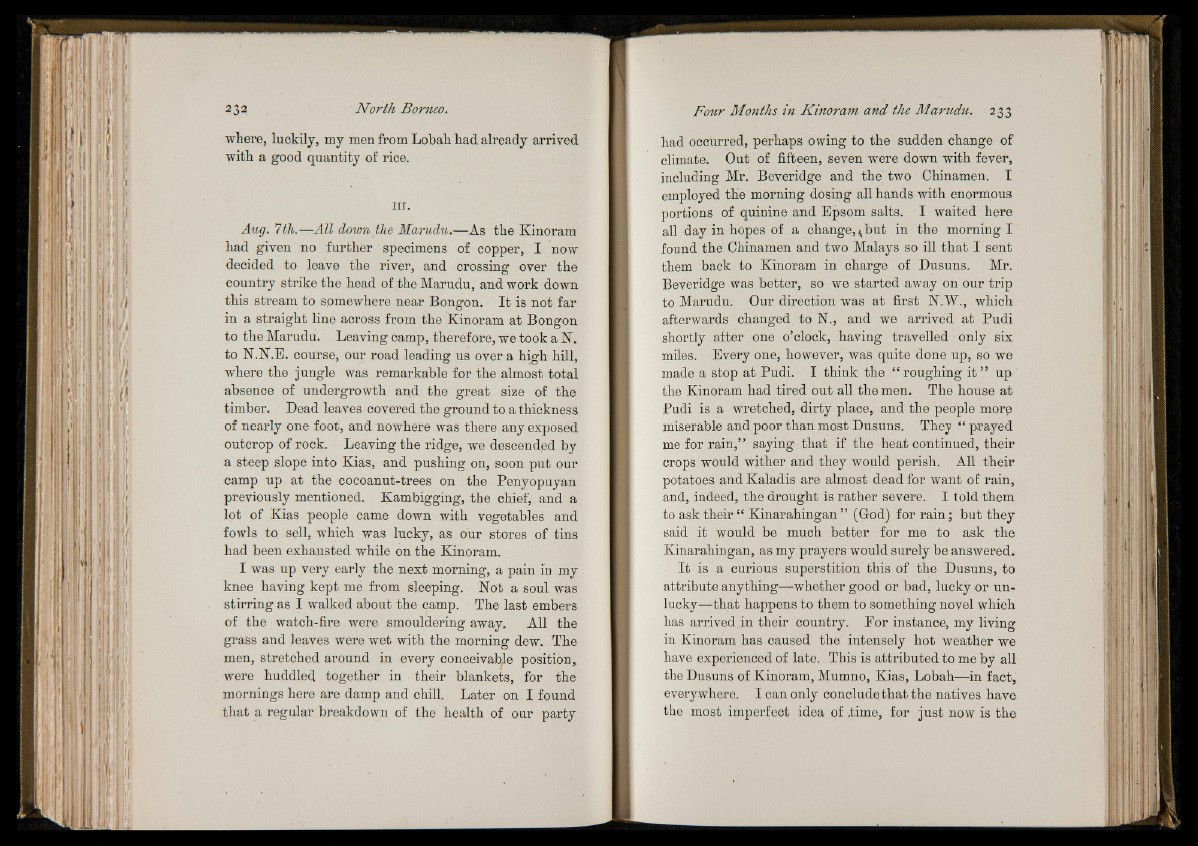
where, luckily, my men from Lobah had already arrived
with a good quantity of rice.
h i.
Aug. 7th.—All down the Marudu.—As the Kinoram
had given no further specimens of copper, I now
decided to leave the river, and crossing over the
country strike the head of the Marudu, and work down
this stream to somewhere near Bongon. I t is not far
in a straight line across from the Kinoram at Bongon
to the Marudu. Leaving camp, therefore, we took a N.
to N.N.E. course, our road leading us over a high hill,
where the jungle was remarkable for the almost total
absence of undergrowth and the great size of the
timber. Dead leaves covered the ground to a thickness,
of nearly one foot, and nowhere was there any exposed
outcrop of rock. Leaving the ridge, we descended by
a steep slope into Kias, and pushing on, soon put our
camp up at the cocoanut-trees on the Penyopuyan
previously mentioned. Kambigging, the chief, and a
lot of Kias people came down with vegetables and
fowls to. sell, which was lucky, as our stores of tins
had been exhausted while on the Kinoram.
I was up very early the next morning, a pain in my
knee having kept me from sleeping. No't a soul was
stirring as I walked about the camp. The last embers
of the watch-fire were smouldering away. All the
grass and leaves were wet with the morning dew. The
men, stretched around in every conceivable position,
were huddled together in their blankets, for the
mornings here are damp and chill. Later on I found
that a regular breakdown of the health of our party
had occurred, perhaps owing to the sudden change of
climate. Out of fifteen, seven were down with fever,
including Mr. Beveridge and the two Chinamen. I
employed the morning dosing all hands with enormous
portions of quinine and Epsom salts. I waited here
all day in hopes of a change,^but in the morning I
found the Chinamen and two Malays so ill th a t I sent
them back to Kinoram in charge of Dusuns. Mr.
Beveridge was better, so we started away on our trip
to Marudu. Our direction was at first N.W., which
afterwards changed to N., and we arrived at Pudi
shortly after one o’clock, having travelled only six
miles. Every one, however, was quite done up, so we
made a stop at Pudi. I think the “ roughing i t ” up
the Kinoram had tired out all the men. The house at
Pudi is a wretched, dirty place, and the people more
miserable and poor than most Dusuns. They “ prayed
me for rain,” saying that if the heat continued, their
crops would wither and they would perish. All their
potatoes audKaladis are almost dead for want of rain,
and, indeed, the drought is rather severe. I told them
to ask their “ Kinarahingan ” (God) for ra in ; but they
said it would be much better for me to ask the
Kinarahingan, as my prayers would surely be answered.
I t is a curious superstition this of the Dusuns, to
attribute anything—whether good or bad, lucky or unlucky—
that happens to them to something novel which
has arrived in their country. Eor instance, my living
in Kinoram has caused the intensely hot weather we
have experienced of late. This is attributed to me by all
the Dusuns of Kinoram, Mumno, Kias, Lobah—in fact,
every where. I can only conclude that the natives have
the most imperfect idea of .time, for just now is the